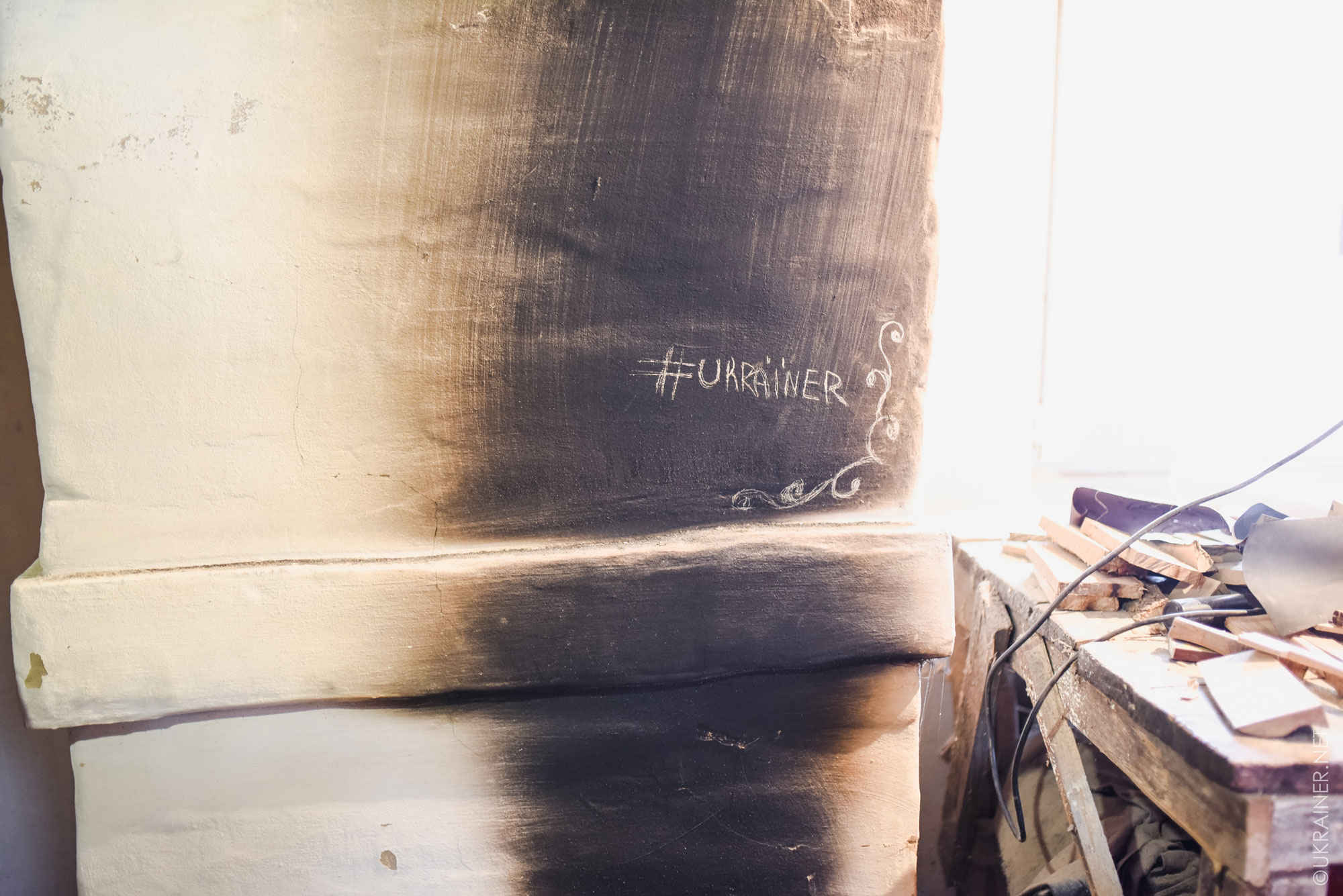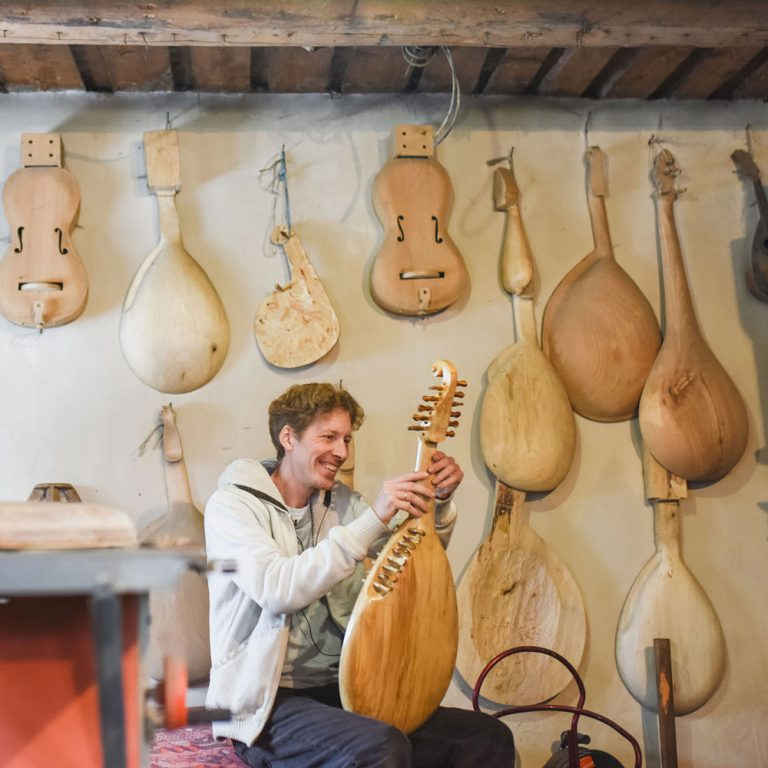Jurij Fedynskyj is an amazing character, one of those who frequently become heroes of films in the style of “Americans emigrate to Ukraine.” In fact, he is not an American at all, and he did not emigrate anywhere, but just returned to where his ancestors had once lived.
Jurij arrived in Ukraine with a huge desire to stay here, to understand and increase the intellectual and cultural wealth of this country. This story is about what has come out.
Sometimes you need a fresh look on an outsider to see the traditions and culture of your area from the inside. Jurij Fedynskyj has become such a person in the Kriachkivka, Poltava region.
Jurij was born and grew up in the USA. As a child, he found a pre-war record of the Bandura chapel in the family library. The melodies and the voice that he heard had a great impression on him. Since then, he has become interested in kobzardom, Ukrainian music and musical instruments. Jurij received his first musical education in Detroit, after that he travelled to America with concerts of Ukrainian music. He came to get his second education in Ukraine:
— When I realized that there were Ukrainian instruments, which were developed here, I wanted to learn how to play one of them. Later I got this opportunity. I remember well the day I was holding the bandura for the first time. It was the Chernihiv bandura for 50 rubles. I could even afford to buy it. It was a great delight. I didn’t want to continue training in the Greco-Roman wrestling. I wanted to go home and feel my bandura. Only then I realized that my instrument was not the best. It is cheap, and it’s great that there exists as such one, otherwise I would not have played bandura at all. Now, in the end, I have the honor to make good instruments. So far, I feel ashamed because of the overall quality of Ukrainian instruments. But the problem is that we have a few left, the soviets destroyed everything. They would not want us to talk about it today. They have done a great deal of harm: no instruments, no information on how to make them.

Before Kriachkivka, Jurij got a chance to live an urban life in Lviv and Kyiv. When he met Mariia, a musician from Poltava, he married her and decided to go away from the city. His family wanted to build their own house, have their own garden, find friends and work together. Surrounding people are very important to Jurij. While looking for a place to settle, he didn’t choose the fertile soils and picturesque landscapes, but first of all good people, like-minded people:
— We chose between the Drevo band in Kriachkivka and the Tafiichuks in the Carpathians. First we decided to live in Kriachkivka, and then to go to the Tafiichuks. But here we had already become members of the Drevo band. They wanted me to be their producer and I finally agreed. But I still cannot solve the money issues. It’s not my thing at all.
Jurij and his wife have already changed their minds to go further to Verkhnii Bukovets village, where the famous Tafiichuk family ensemble lives:
— It’s not easy. We have settled down here. It’s been seven years here in Kriachkivka. This is the place we can always return to if we go somewhere further. Who knows what will happen in the future. Mykhailo Tafiichuk still lives here and I would like to play and master with his band. But we’ll see. Here people come to me constantly and expect that I will teach them to make musical instruments in the studio. Leaving this post is too serious. We are building houses here and the workshops have been made, and not like it used to be: they crafted in a shed.
Jurij’s father is partially an Irishman, partly a German, and his mother has Ukrainian roots. Their long line has been continuing in the United States:
— I know that there was a certain Fedynskyj ancestor from the Carpathians and perhaps even from the village of Yabluniv. There are grandfathers from Kyiv. But the ancestors of my great-grandmother’s family were from Poltava region. And I’ve come here with the idea that my ancestors lived here and this is my land. I’m not a guest here. Who knows, maybe they were from Kriachkivka.
— I can say that I came back home after 250 years since the destruction of Sich
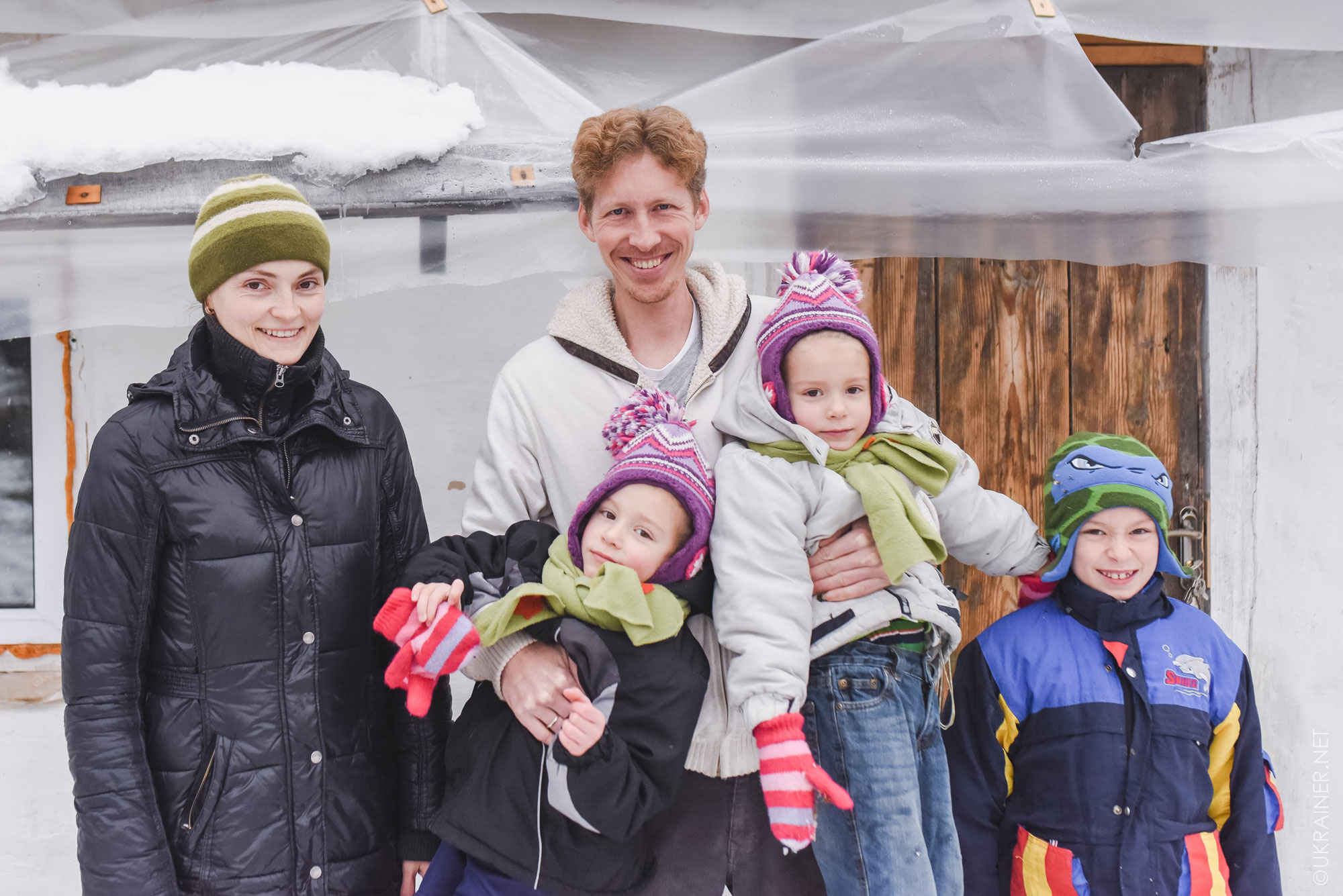
The newcomers
People from Kriachkivka are still not used to new people in their village. The Fedynskyj family is still called “aliens”, despite the fact that they have been living here for ten years.
Most of the local people are surprised that someone does not live according to their rules. For example, Jurij just here, in Kriachkivka, began to master agriculture. For the first time, he picked up a shovel and a hammer. For the local, at least, it is weird. Neighbours also did not understand why Jurij was building a house not like everyone else did, but choosing natural materials. They said that the house would not stand. Now they are surprised how this “American” does not plant more potatoes than is needed and why Mariia cares about vegetables a lot. The difference in perception and attitude towards simple things, as we see, can be colossal.
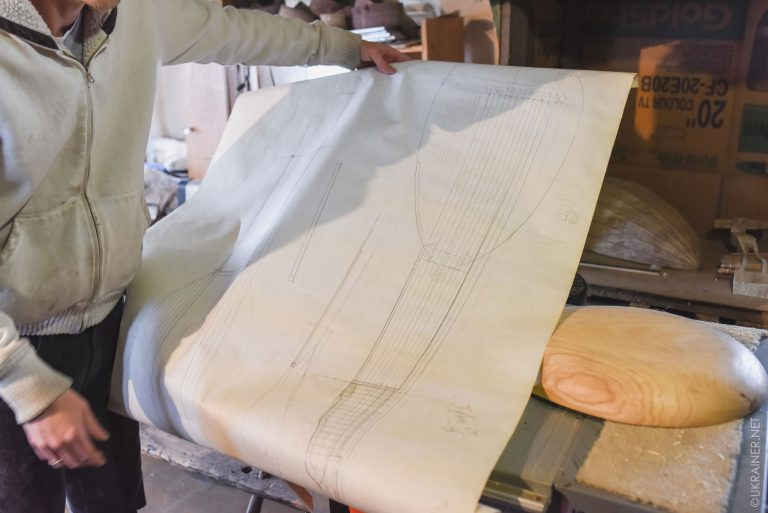
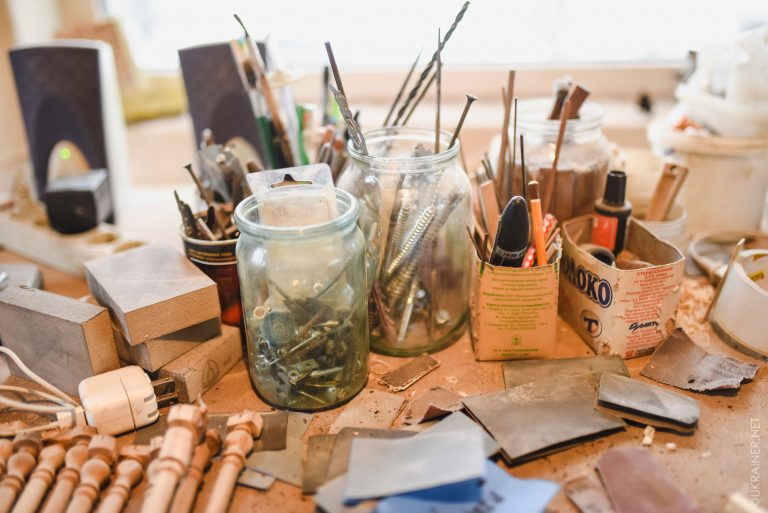
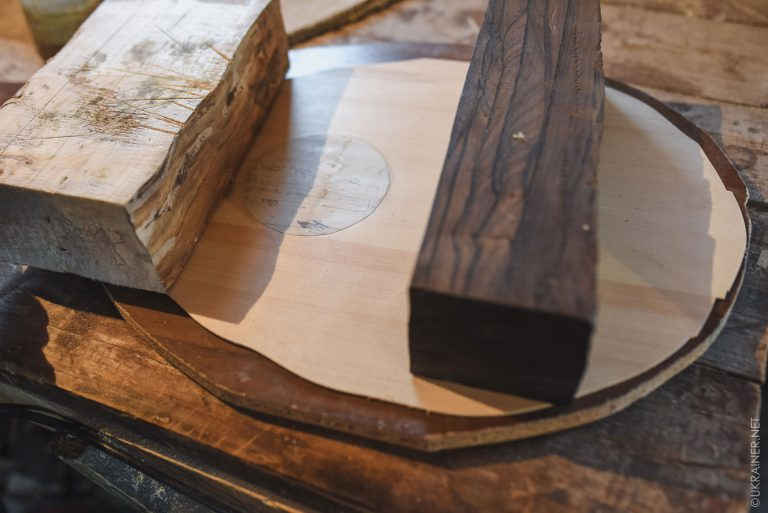
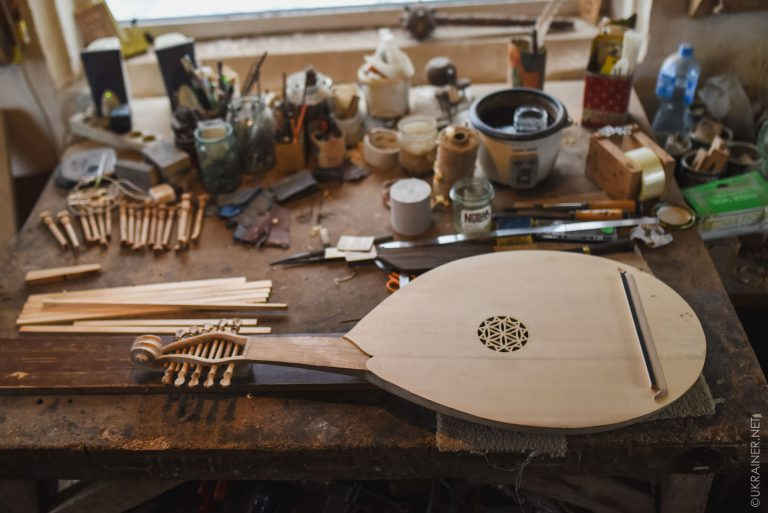
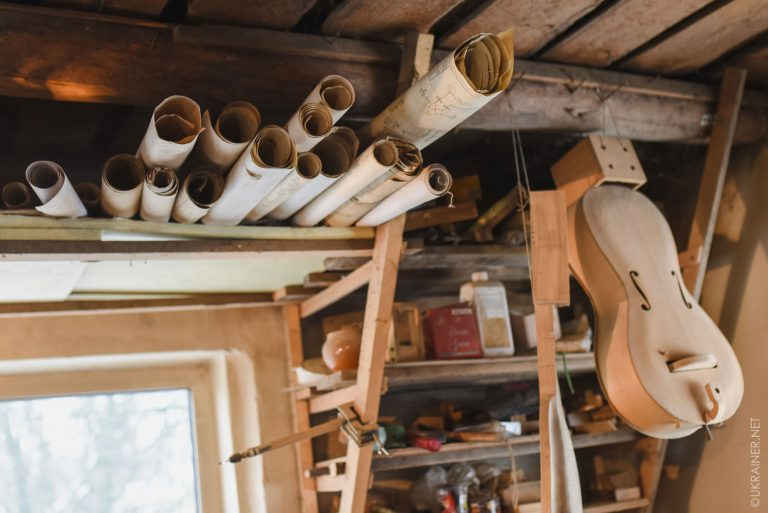
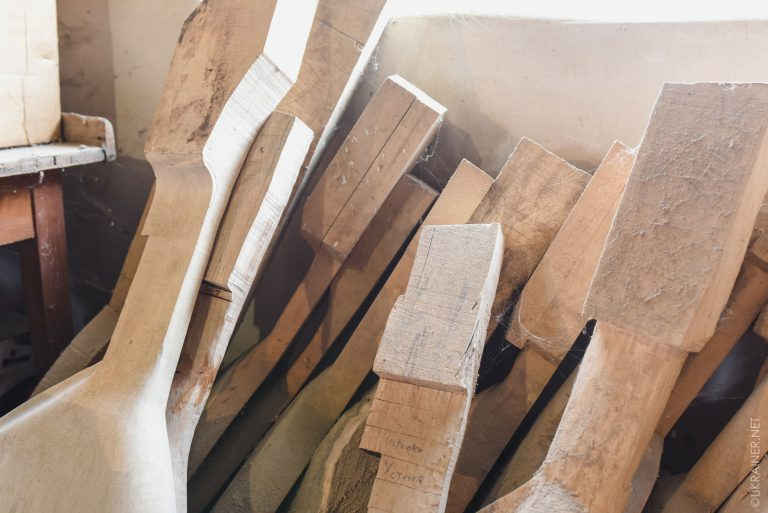
slideshow
Jurij looks like a hero of the film of the early twentieth century. He speaks fluent Ukrainian, and for 16 years of his life in Ukraine he still has not lost a bright American accent. During a conversation, he smiles, still shines from the inside. Even when he speaks about his own problems and about what kind of damage was caused to Ukraine by the Soviet occupation.
Everywhere in the house — Jurij rebuilt it from the old country house, turning it into a modern apartment in the traditional style, there are hanging cards with English words. So Jurij and Mariia teach English to three of their children. Mariia tells about their homework:
— We have a kindergarten here in the summer. All children from the surrounding houses gather together. For the most part, people do not live permanently here, but only in the summer they come from the city. It is difficult to live here, we are now reclaiming a village school. But the school system in rural areas is ineffective. We want to make our own, but I do not think that our fellow villagers, who raise their children here, will support or understand us.
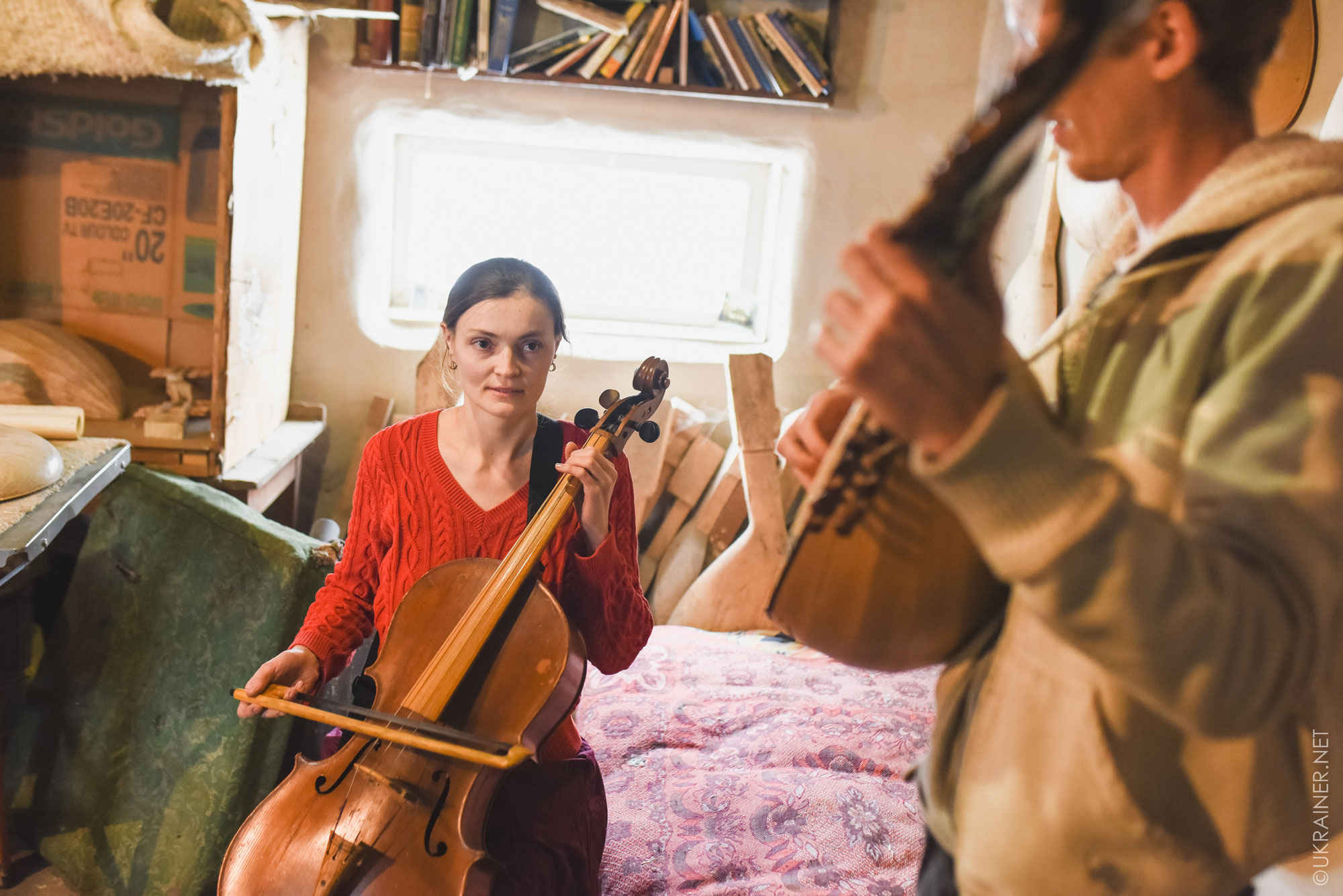
Mariia moved from the city to the village and did not regret it. She seriously got to the reformation of the village and even became a deputy to the local village council. She tries to embody her ideas and dreams in spite of the complex bureaucratic system.
Jurij said that he taught English to local children for free. Only a few students studied, and later their parents took them away:
— I suggested all local teachers teach them English every Sunday. Both older and smaller. But nobody comes, nobody needs it. They do not understand at all how it can be: I came here and I will teach them something. But they must teach me!
And I’m learning, but there’s no exchange.
There is a school in Kriachkivka. It is located in an old manor estate. There are more than 20 children in the local kindergarten, they are future schoolchildren. For the village, it’s a lot. However, schools want to close, in order to cut costs from the local budget. People started taking their children away because of the threat of closure. They believe that better education can be provided by a school with more children in the classroom, so they transfer their children to a school in the neighbouring village. The family of Fedynskyj do not think so and see no reason to close the school. They tried to convince everyone that they should not do that. They already have four children and their son Myroslav has recently gone to school. Jurij tells:
— We say that this is nonsense, it’s fictitious, it’s some sort of machinations, and Myroslav will remain at school, and they say he will study only one hour per day. Perfect, but Myroslav will save the school.
Therefore, the school in Kriachkivka is not closed, because according to the law, if at least one of the parents does not withdraw the documents of his child, then the school must work:
— Parents will not take the documents until their teacher forces them. And it happened. We went to this teacher and asked why she did this, what makes her take the documents. Of course, she didn’t respond.
Jurij believes that they will find a way out anyway:
— The next year there’ll be more children at school because the girls are growing up. Maybe somebody will think over and undertake. At first, we wanted Myroslav to study at home. If they give one hour extra — it’s even better. But if they close the school, we will learn them at home.
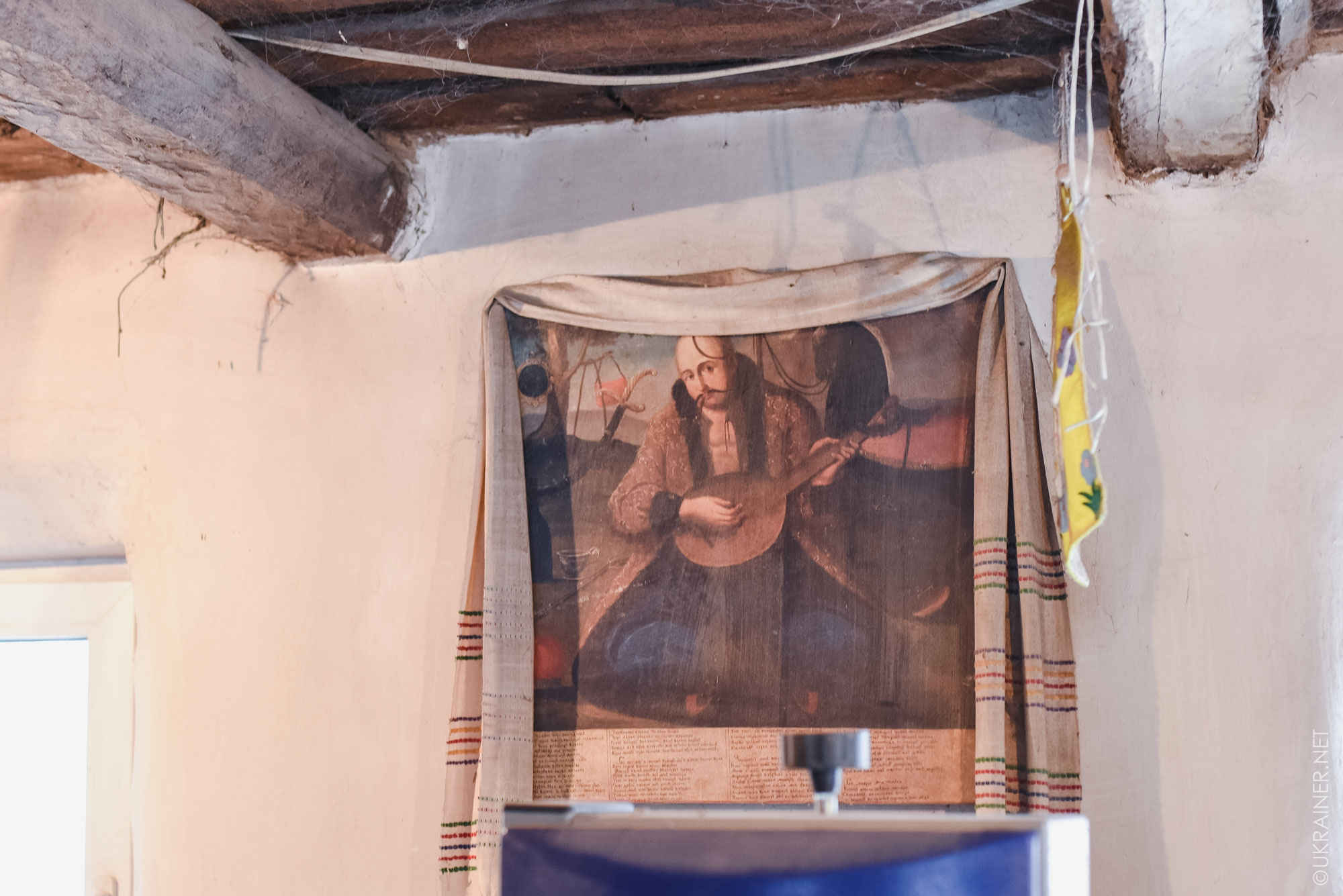
Museum of Kobzardom
Jurij’s new project is a kobzar museum. He plans to bring together work and instruments from the family collection and by using money of the Ukrainian diaspora, create a modern museum in the village, where tourists will come:
— A few months before my uncle, who lives as an emigrant told me to build a museum. And I’m building. I have huge financial problems. Relatives say that there can’t be museum in Kriachkivka, where Putin takes everything. We will give nothing to him.
But even if Jurij does not get some money for charity, he has an intention to build a museum, though it will be much smaller. Reconstruction of the old Ukrainian instruments, which he made in his own studio, will become new exhibition samples. Jurij believes that such a museum is very needed here, in Poltava region:
— I am increasingly convinced that the Poltava region is the core of the kobza. They say that the kobza was created here, in the city of Zinkiv, near Poltava. But in Poltava region, there is no museum of kobza. So someone has to set it up. And here I am ready to serve as I can. Previously, it (kobzardom – ed.) was in a different form: there were Cossacks, kobzars or something like that. We still know very little about this.
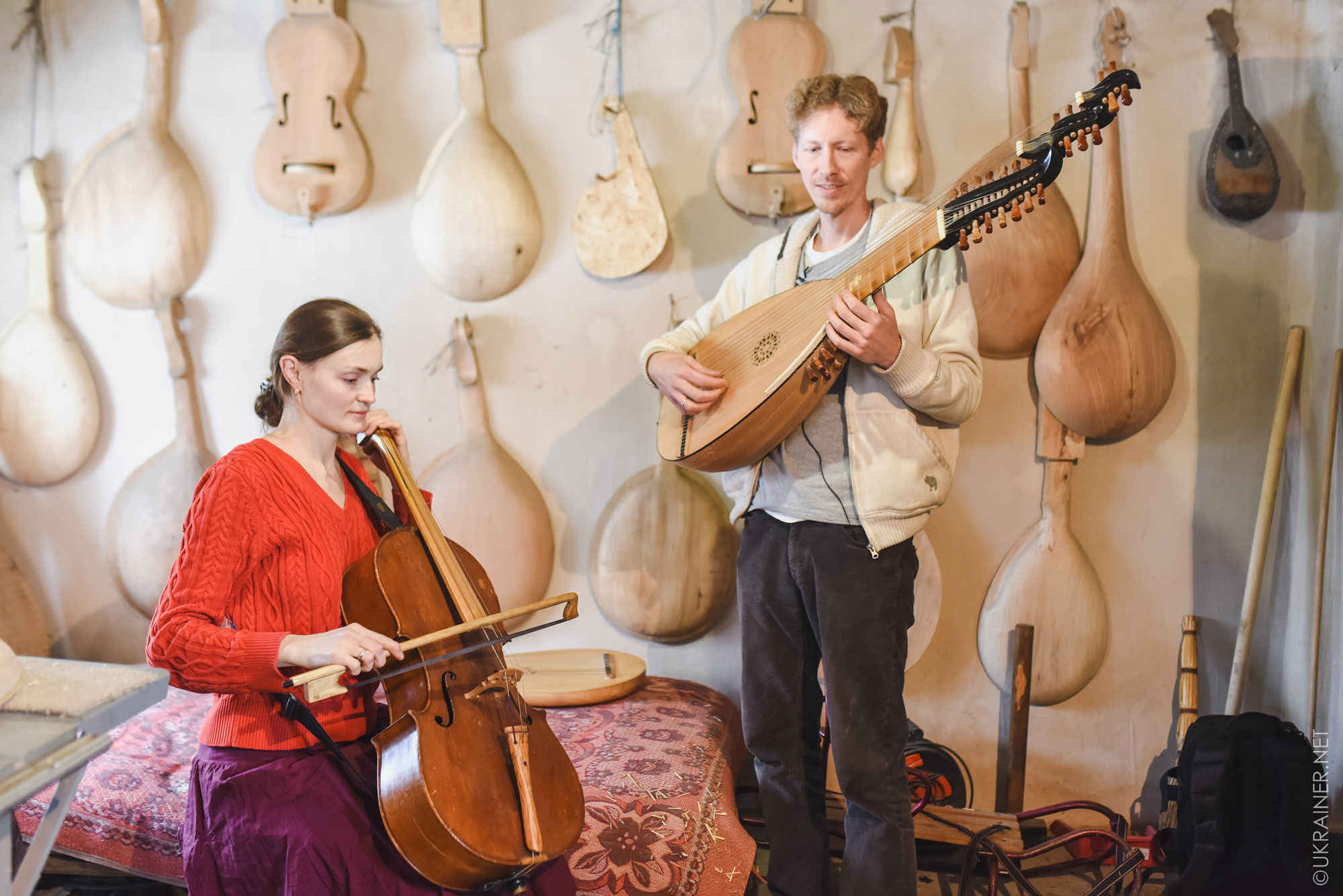
Kobzar Festival
Once a year, Jurij and Mariia hold a small festival “Tree of the Kobzar generation” in Kriachkivka:
— It all began as a camp for training my students and the formation of a kobza workshop in general, because there are other workshops in Kharkiv, Lviv, Kyiv. We had a couple of weeks for working in order to become better as an institution. But it turned out that other shops were not so interested in our promotion, because they have their own shares. We have been holding the training camp more than six years and were ready to present our work to the public. There were activists and I offered them to hold the festival without money. They said it was impossible, because we needed to bribe an official. And I want to do everything honestly, according to the rules. And where should we do it? Maybe here in Kriachkivka? And we did everything with the minimum efforts, because we had already prepared for the camp, we had everything. It is not an artificial festival — it’s a real place of work. We put the music in practice and make some instruments. We have had several festivals, and my dream came true. The festival is called “The Tree of the Kobzar’s Family”. The Kobzar tradition has its own family tree, the roots of which is traditional kobzardom. We are the present branches of this tree, some of us are the leaves that have just begun. It is not a commercial festival and not for the mass audience. Of course, we’re just waiting for people to come. But most of them do not understand this program. They need vodka, they need a drum. And what is fun without this? It also has to be something for sale. But there are people from the city who love to visit us, people from abroad who are interested in kobzardom and Ukrainian culture. They come. But I would like my neighbours to come too.
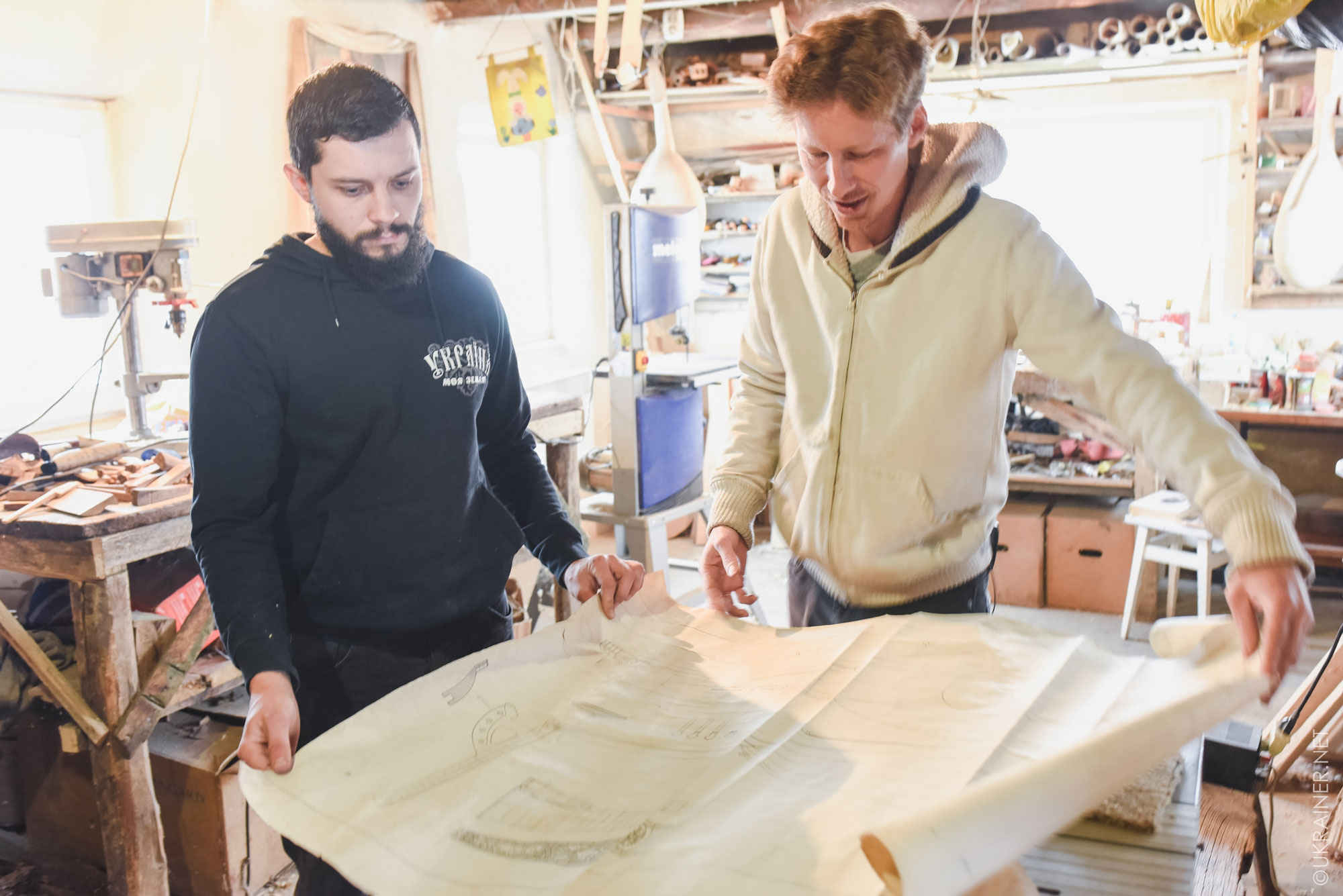
Training and craftsmanship
Jurij began to make his own instruments simply because he didn’t have his own kobza. He had no money to buy an instrument. Now he is already able to make kobza, bandura, torban, lyre and harp:
— Then I had just the opportunity to do everything myself, I had some wood. I hadn’t got an instrument, then I started making the first kobzas. I liked the process of mastering. As a child, I loved playing with Lego. And it’s like toys for adults. You do what you want. I’ve already made not only banduras and kobzas, I’m already making the most complex Ukrainian instruments. One of the most difficult is the torban. And I’m already playing it. But I’m not going to stop. This can be a good and profitable profession, but in fact, I’m not earning anything at all. But I want to make even better instruments. The bandura I’m making now has to be even better than the previous ones. It is special in sound, in shape, even in ornament. The previous banduras are much heavier, they have metal strings, but mine will have nylon strings. It has got a very thin deck. It’s a very resonant instrument. Most of the banduras are made of willow, and this one is made of maple. There will be the possibility to compress the fingerboard, not just play as the harp. The instruments should be traditional, but we have so little left of traditional ones. I believe it’s possible to make the instrument even better.
Jurij with such enthusiasm and love tells us about his instruments:
— For example, in the construction of my bandura, there is a lot from the lute. Lute players still have a lot of information on how to do a good resonance instrument. I learn from them. Here we have not 5 basses, but 10. Or rather, they are duplicated. Such duplication is found in Ukrainian traditional bandura, but not often. With the help of these basses there will be total sound spectrum. This is a moment of a certain development for me. We have already made the exemplary kobzar banduras. Now we are making some creative reconstruction. This should be the musical instrument itself, and not the one that hangs on the wall. The old kobzars had bad instruments that sounded bad, difficult to play. This is due to the fact that the kobzars lived in a poor country. In tsarist Russia, the king was hostile to the kobzardom. Therefore, skill level was very low, judging by those preserved instruments. Unfortunately, there are too few of them. Were there such gorgeous samples of bandura in those days? Probably, they were.
— Hetman Mazepa did not play on some firewood, his instrument was made from rosewood. Where did he find a rosewood, maybe in Asia
Perhaps there were even the shops in Baturyn or Hlukhiv. We have a lot of things in Ukraine, many cheap, unfortunately. Ukrainians are smart, they say, “Do not buy Chinese thing!” But then we make something worse and more expensive, unfortunately. And how can we take some firewood for a concert? If our ancestors played such a thing, so must we do the same? So they did not pay attention to the appearance of the instrument, it was secondary. But not for me.
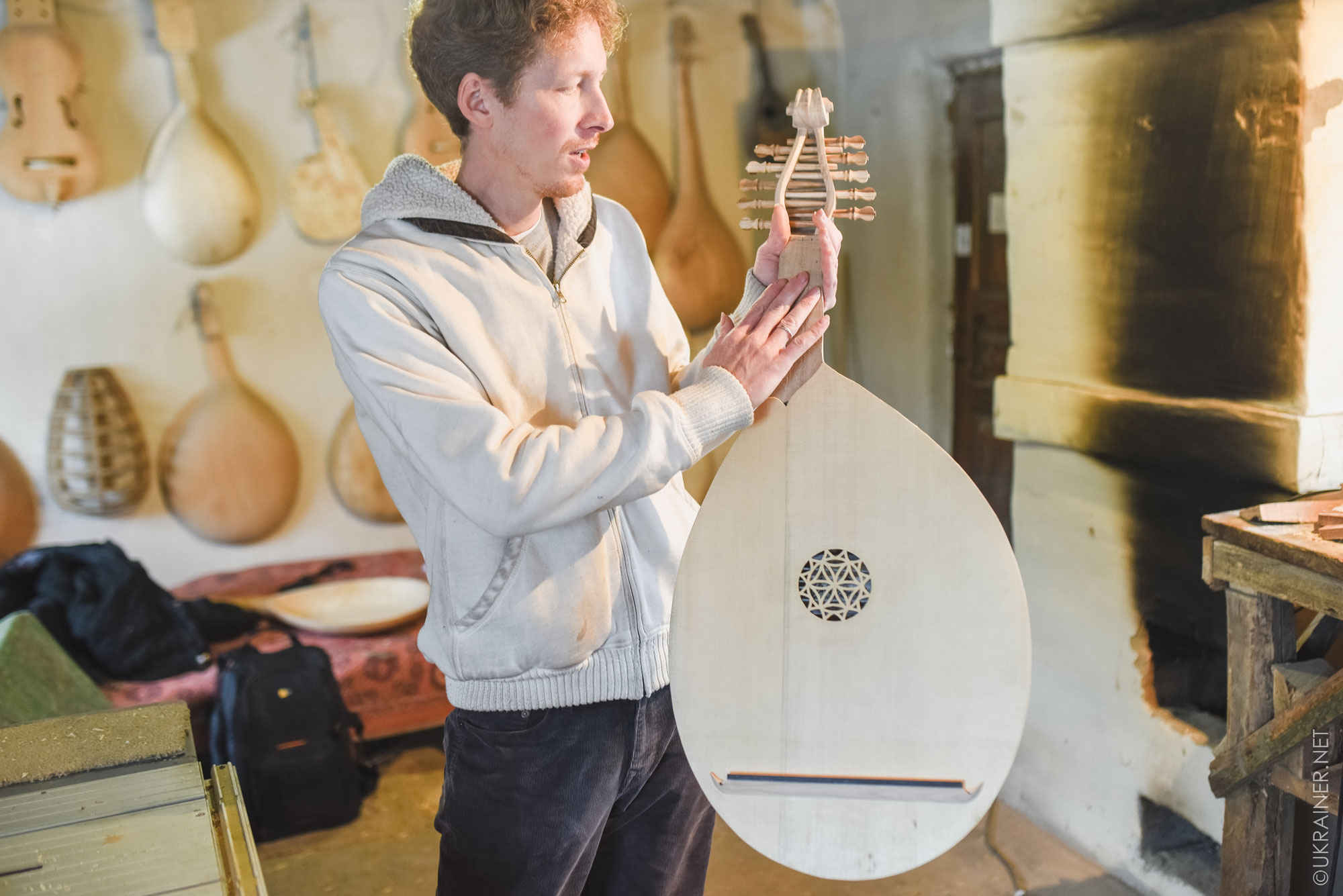
My first instrument was the piano. It stood in our house. I was 6. I had the first banduras in the age of 16. Then my aunt and my uncle told me to go for studying to Julian Kytasty, that it would be interesting. I got carried away with it. I loved the diaspora companies, because we did not live in the diaspora, we lived among Americans. And the spirit that was there, was the spirit of Bandura Chapel, music and social affairs — it was extremely interesting. And I have been studying for 10 years. It was time to look for something new in the kobzardom, and I came to Ukraine. And I found. At first, I studied at the music conservatory. But later I realized that I was more interested in the tradition of playing bandura. Because there are Soviet traditions in the conservatory, they were not kobzar traditions. There were also teachers who were totally uninterested in kobzar traditions. I decided to stay away from such people. And this decision was correct. During my studying in conservatory I found out about the existence of the Kyiv kobzar shop. That was an extremely interesting group. I have lived and worked with them for 10 years in Kyiv. Until the moment when the time has come to say goodbye and create my own kobzar group, where the kobzardom would be in my own way, as I understand it. I am independent, I teach in the way I want. Because I do as I believe it is right, not like others.
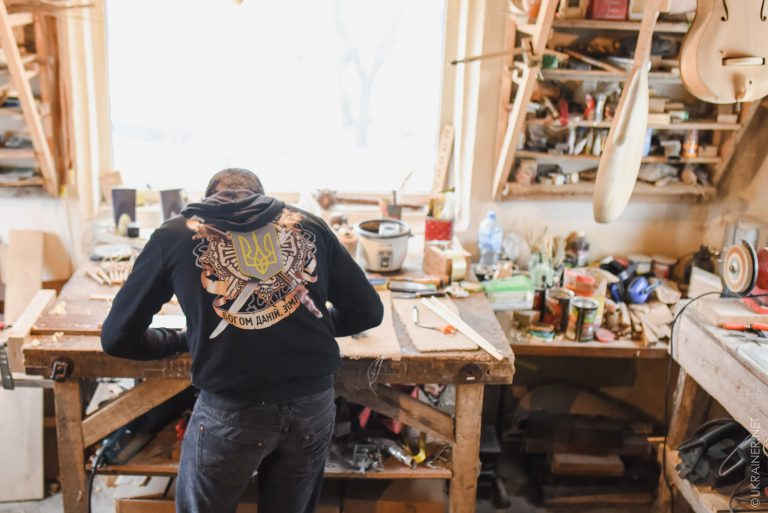
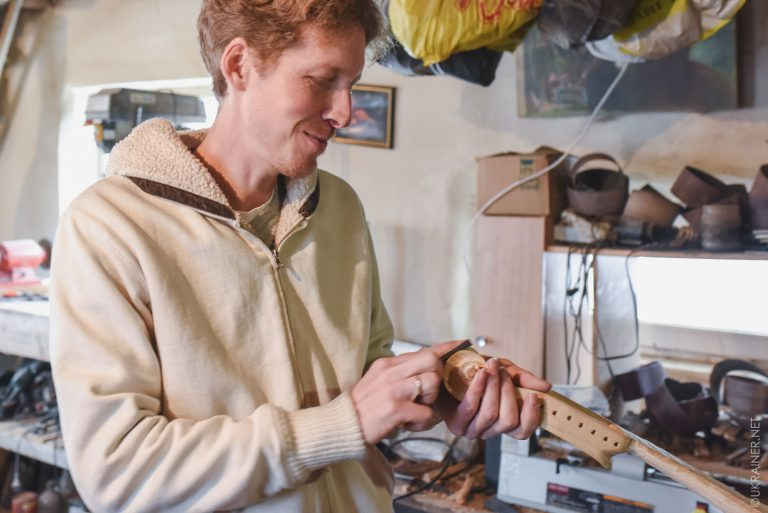
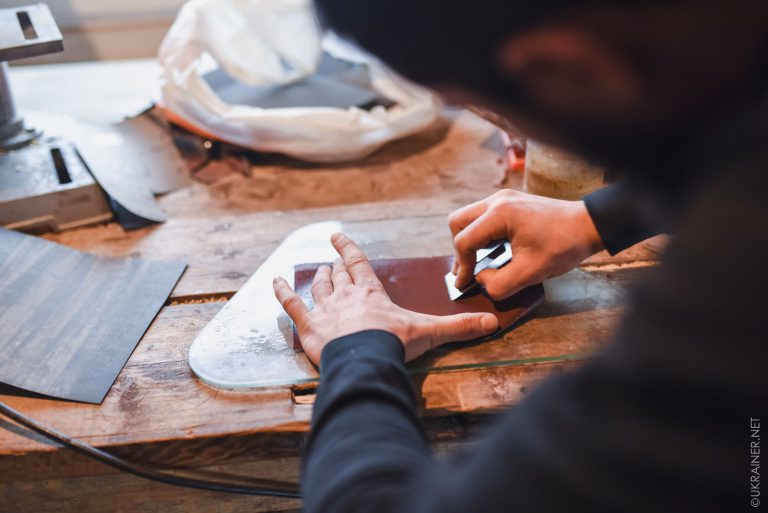
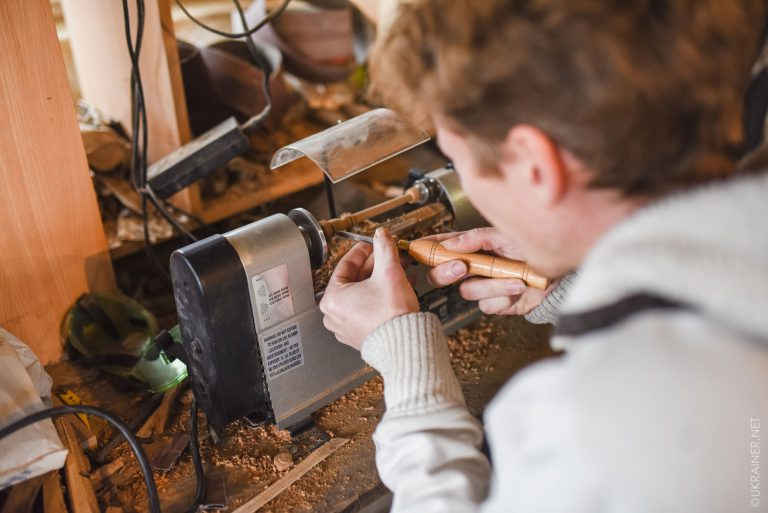
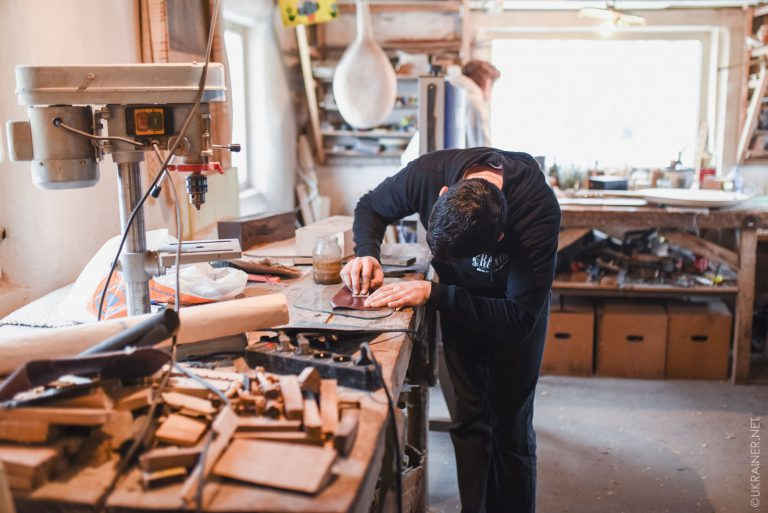
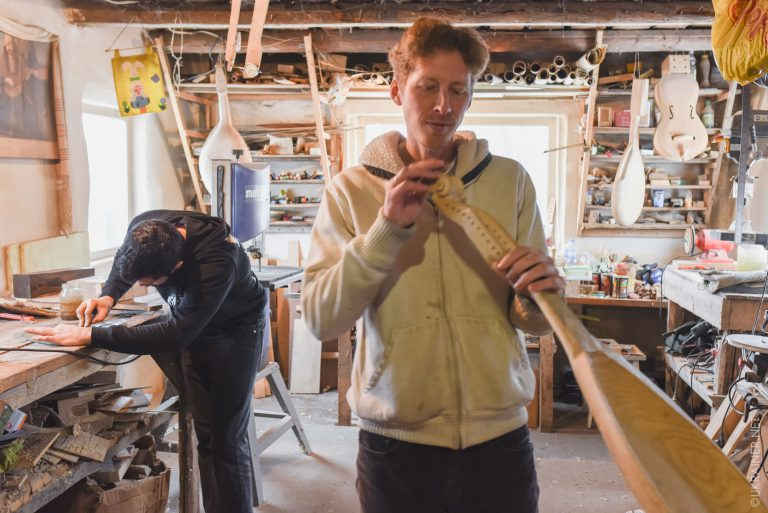
slideshow
As in all cases of Ukrainians, there are lots of superstitions in the kobzardom. After all, superstition is part of tradition. They say, for example, that a woman can not make or touch the instrument. You must also write not only a name, but also some prayers on the bandura. About prayer, I think it helps, anyway, if it’s genuine. There is such a film “The guide”. There is such a moment when they say, “Yeah, without soundposts, there is no voice, no soul in the instrument. Therefore, they say, an instrument without a soundpost is no longer a kobza, not a bandura”. I understand that the director just paid attention to our workshops, because we do not put soundposts on our instruments. As for me, this is a myth, a superstition. But many masters of bandura, kobza and lyre have no examples to follow. And violin masters have got lots of their violins. Many things from violin mastering are transposed to bandura, for example, a soundpost. But it’s not necessary to have it. The masters often follow the myth instead of making a good instrument. Mastering is a social process and most of masters are not professional craftsmen, but fans. But all that is done with love and it’s great. And so, there is great success in our community of masters. Because there are also those, who want to make not only with love, but want to become professional craftsmen, to have the best instrument. And that’s fine.
The soundpost
A small piece of wood that connects the sounding board and body.One bandura can be made quickly or for a long time. I can make a kobza for two weeks, as I made. I will not do this anymore because it is a compromised instrument. But there is also a need for cheap instruments so everyone can afford to play. There are already enough masters who handle it. I want to make the best instruments, without any compromises on time. Sometimes it lasts for too long. But I’m not in a hurry, I don’t work to order, no one forces me. I make the instruments which I would play myself, and I would not be ashamed of that. After all, the instruments have to sound. This is not for a wall or a museum. Yes, they will be in a new museum for a while. And that’s fine, because I’ll see that the instrument is stable, that it does not move, does not spin, is not destroyed. But, finally, someone has to play the instrument, so that they serve a long time for somebody.
I have all sorts of drawings for the kobza, the bandura, the torban. We make them more often. These are precise drawings, so that we know how to make the smallest details. I’ve already made 20 instruments. It’s hard to say exactly how much time it takes for a separate instrument, because I usually make a few at once. Now I’m making kobza and torban. It’s a bit hard, but I have a choice every day. This is also important for inspiration.
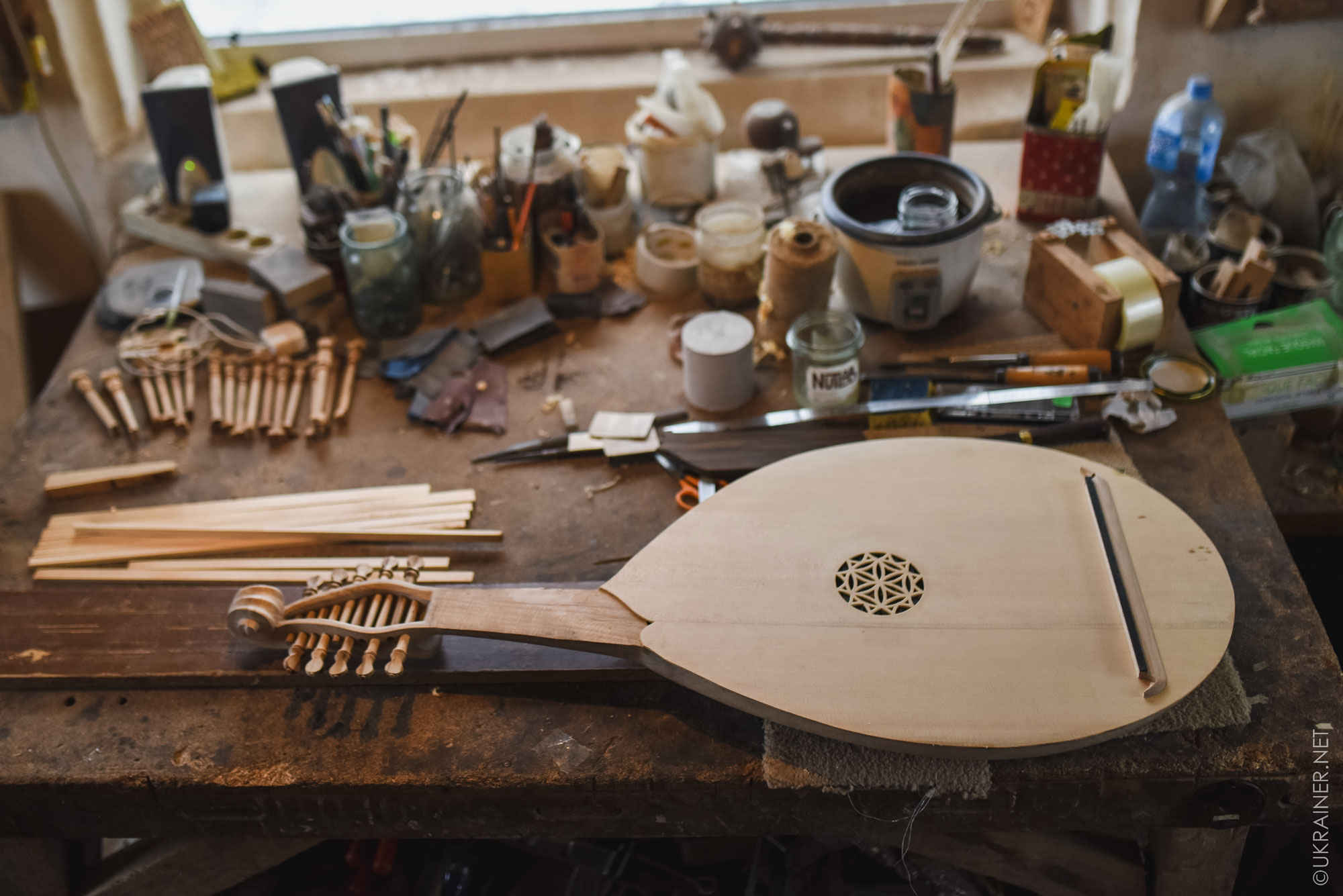
Materialism
— Money multiplies problems, but do not solve them. Of course, I do not have all sorts of material things I’ve had in America, for example, a car. But it is conditional. One day you are happy, because you can go, and the other day you are unhappy because you break down and you can not go. Therefore, I do not believe that you will find happiness through material things. The philosophers say that we have everything. Maybe you want to go somewhere, but it’s better not to go there. I have to go home and work. It will be perfect happiness. Someone can find a benefit from my example. I want to show that you can live, how Ukrainians live. And then you don’t have to get money. You’d not get by without money in America. It is possible, while living abroad, to transfer money here, but this is not the best way. If you are Ukrainian, and if you are leaders, intellectuals, many of whom emigrated, then your being should be here for really helping, not just send money transfers.
There are followers of Jurij Fedynskyj, who are moving to Ukraine:
— I know among Americans, Ron Pastelan who moved to Ternopil region, Lida Matyiashyk-Chorna moved to Kyiv. There is also diaspora in other countries. I know people from Poland who have moved here, one woman from France comes here very often. A guy from Australia came here to make a bandura. And he also wants to move to Kriachkivka. He says he will finish the university and come.
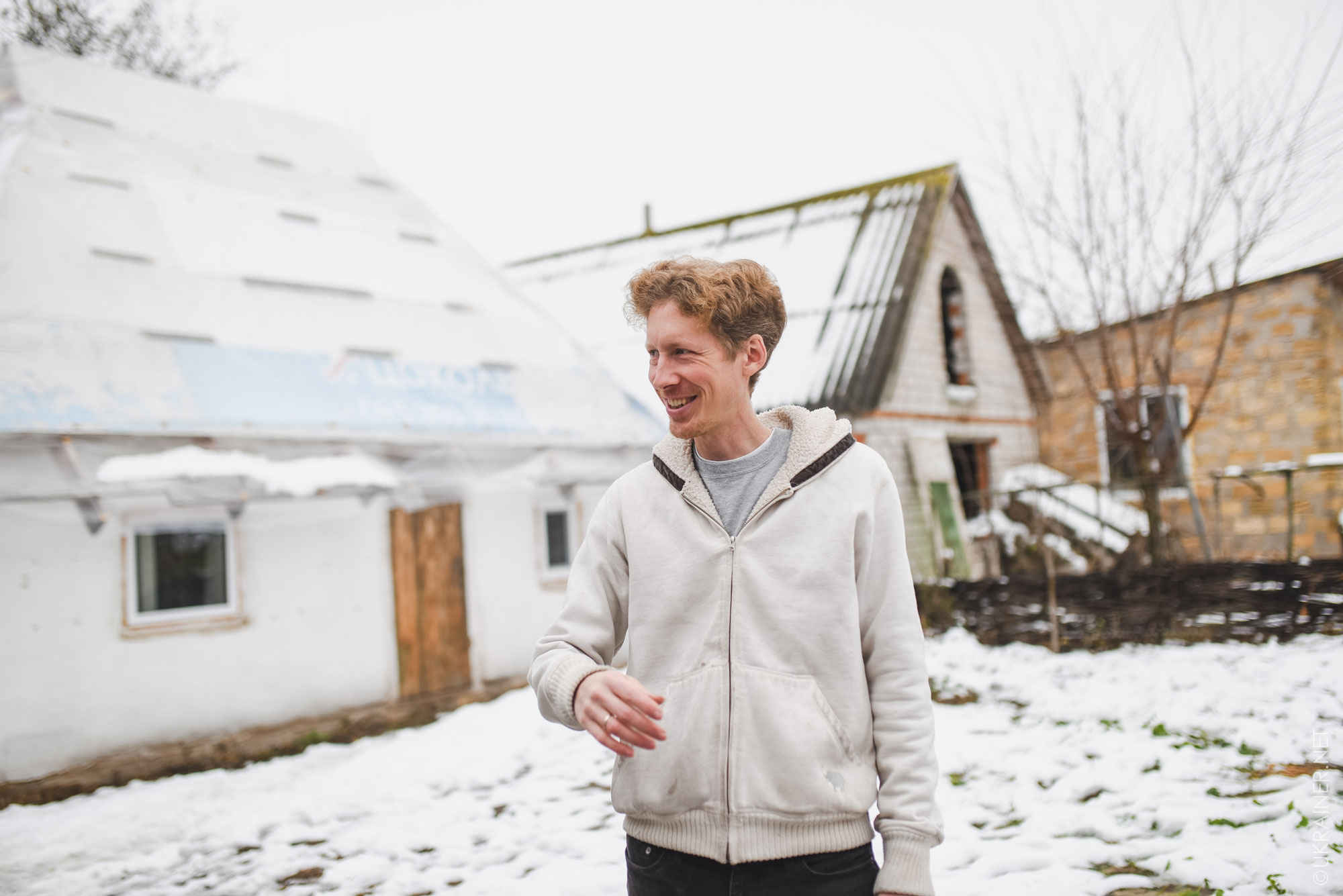
Jurij brought us to a new rural house, which he built for a year from scratch. The house now has its own new studio, which holds dozens of instruments.
— This is a super warm home, here’s one small oven which warms up everything. My students live here. We did it as a studio of recording a disc for the Tree. I have equipment for work with other groups: Khoreya Kozatska, Carpathian. We make quality records. I call this place a church-house, but it is also the first museum object where we can imagine instruments. This is not a mud hut, though it looks like that one. This is an American straw house. The bales are simply folded, compressed, then clay-sand mixture is rubbed.
— But I built such a small house to understand the technology, if I build a museum — I will need a better one. And I wonder will it stand? Neighbours did not believe: they said that the mouse would eat everything. And the mice are still creeping a little bit there. We need to close the holes and, possibly, put the poison or get a cat. And I’m ready to do something more with my own hands, I do not doubt. It will be cheap, warm and worthy.
Ukrainian history and musical tradition are the things which can drive this man. It is likely that without this record in the record library or without the Chernihiv bandura for 50 rubles, the life of Jurij Fedinskyy could have turned out quite differently.
